By Leen Randell
Updated: Jul 08, 2024
10 Best Herbal Decoctions For Tinnitus

Herbal decoctions for tinnitus are natural remedies made by steeping herbs in hot water, which can help alleviate the symptoms of tinnitus.
These decoctions work by reducing inflammation, promoting blood circulation, and calming the nervous system, thereby providing relief from ringing, buzzing, or other abnormal sounds in the ears. Examples of herbal decoctions that have shown promise for tinnitus include Ginkgo biloba, St. John's Wort, and Passionflower.
By using these decoctions, individuals with tinnitus can experience improved sleep quality, reduced stress levels, and enhanced overall well-being, allowing them to regain control over their daily lives.
The following article describes in detail the most important decoctions for tinnitus, including medicinal properties, parts of herbs to use, and recipes for preparations.
- 1. Ginkgo biloba
- 2. Hypericum perforatum
- 3. Bacopa monnieri
- 4. Curcuma longa
- 5. Lavandula angustifolia
- 6. Valeriana officinalis
- 7. Melissa officinalis
- 8. Passiflora incarnata
- 9. Camellia sinensis
- 10. Glycyrrhiza glabra
- What is the best combination of herbal decoctions to use for tinnitus?
- What ailments similar to tinnitus are treated with herbal decoctions?
1. Ginkgo biloba
Maidenhair tree decoctions helps with tinnitus because it contains compounds that have been shown to possess potent antioxidant and anti-inflammatory properties.
The decoction's bioactive ingredients, such as flavonoids and phenolic acids, can help reduce oxidative stress and inflammation in the auditory system, which are believed to contribute to tinnitus symptoms.
By soothing the irritated nerves and reducing inflammation, maidenhair tree decoctions may help alleviate the ringing, buzzing, or hissing sounds associated with tinnitus.
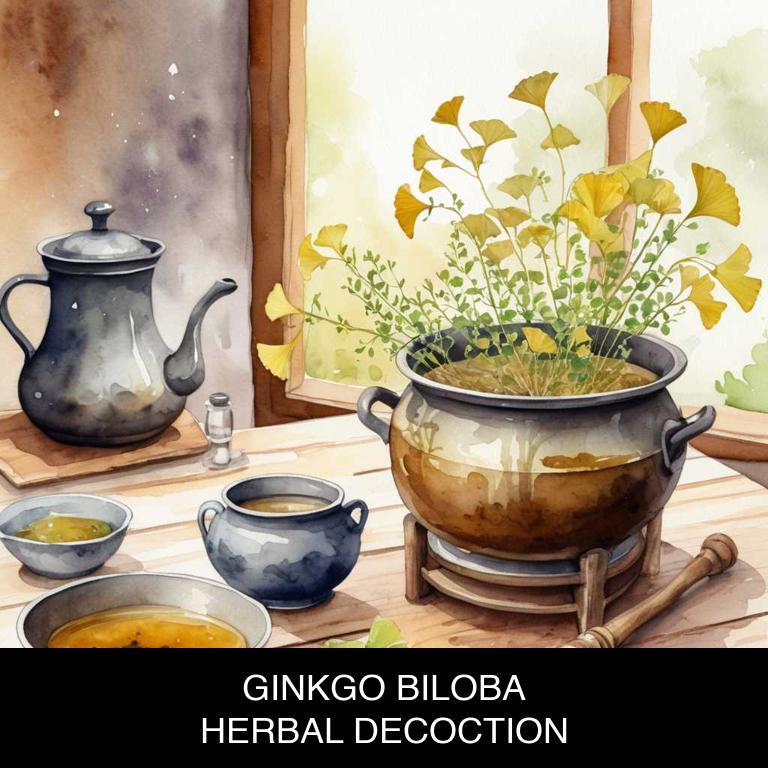
Medicinal Constituents
The list below shows the primary medicinal constituents in Ginkgo biloba decoctions that help with tinnitus.
- Flavonoids: These compounds help with tinnitus by reducing oxidative stress and inflammation in the inner ear, which can contribute to the development and progression of tinnitus.
- Bilobalide: This sesquiterpene lactone has neuroprotective properties that may help to reduce the damage to auditory neurons and improve blood flow to the inner ear, thereby alleviating tinnitus symptoms.
- Ginkgolides: These sesquiterpene lactones have anti-inflammatory and antioxidant effects that may help to reduce the inflammation and oxidative stress in the inner ear, which can contribute to tinnitus.
Parts Used
The list below shows the primary parts of maidenhair tree used to make decoctions for tinnitus.
- Leaves: The leaves of the Ginkgo biloba plant are primarily used to make decoctions for tinnitus due to their high content of bioactive compounds such as flavonoids and bilobalide.
- Seeds: Ginkgo biloba seeds are often used in decoctions for tinnitus because they contain a high concentration of ginkgolic acids, which have been shown to have anti-inflammatory properties.
- Roots: The roots of the Ginkgo biloba plant are sometimes used in decoctions for tinnitus due to their rich content of ginkgolides, which may help to improve blood flow to the inner ear.
Quick Recipe
The following recipe gives a procedure to make a basic maidenhair tree for tinnitus.
- Harvest 1-2 cups of ginkgo biloba leaves from a mature tree in late summer or early fall.
- Clean the leaves by rinsing them with cold water to remove dirt and debris.
- Dry the leaves by spreading them out in a single layer on paper towels for 24 hours.
- Steep 1 teaspoon of dried ginkgo biloba leaves in 8 ounces of boiling water for 3-5 minutes.
- Strain the decoction through a fine-mesh sieve into a cup to remove the solids.
2. Hypericum perforatum
St john's wort decoctions helps with tinnitus because it contains hyperforin, a potent antioxidant that has been shown to reduce inflammation and oxidative stress in the inner ear.
This can help alleviate ringing in the ears by calming down damaged nerves and promoting healthy auditory function. Additionally, St John's Wort's anti-inflammatory properties may help to reduce inflammation caused by bacterial or viral infections, which are common triggers of tinnitus.
By reducing inflammation and oxidative stress, St John's wort decoctions may offer relief from tinnitus symptoms.
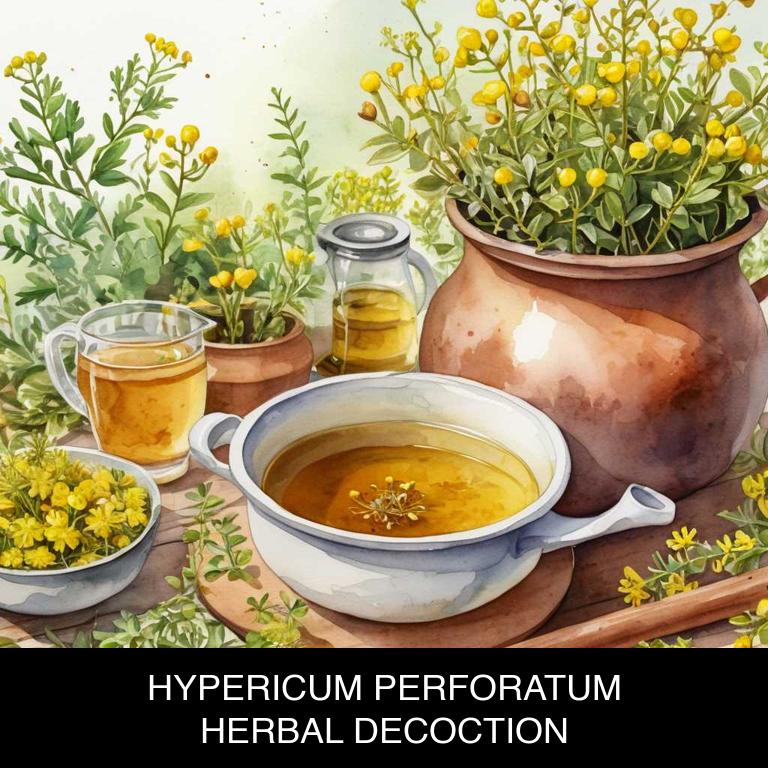
Medicinal Constituents
The list below shows the primary medicinal constituents in Hypericum perforatum decoctions that help with tinnitus.
- Hyperforin: Hyperforin, a phenolic compound, has antioxidant and anti-inflammatory properties, which can help reduce oxidative stress and inflammation in the ear, alleviating tinnitus symptoms.
- Flavonoids: Flavonoids, a type of phenolic compound, have anti-inflammatory and antioxidant properties, which can help reduce inflammation and oxidative stress in the ear, contributing to tinnitus relief.
- Naphthodianthrones: Naphthodianthrones, a type of phenolic compound, have anti-inflammatory and antioxidant properties, which can help reduce inflammation and oxidative stress in the ear, alleviating tinnitus symptoms.
Parts Used
The list below shows the primary parts of st john's wort used to make decoctions for tinnitus.
- Leaves: They contain hypericin and hyperforin, which are believed to have anti-inflammatory and antioxidant properties that may help alleviate tinnitus symptoms.
- Flowers: Rich in flavonoids and phenolic acids, flowers of Hypericum perforatum are thought to contribute to their potential therapeutic effects on tinnitus, including anti-inflammatory and antioxidant actions.
- Stems: Stems of the plant are also used, containing hypericin and hyperforin, which may help reduce inflammation and alleviate tinnitus symptoms due to their antioxidant properties.
Quick Recipe
The following recipe gives a procedure to make a basic st john's wort for tinnitus.
- Harvest 25 to 30 grams of fresh or 10 to 15 grams of dried aerial parts at the peak of flowering for maximum potency.
- Chop the harvested plant material into small pieces to increase surface area for efficient extraction.
- Combine the chopped plant material with 1 liter of boiling water in a heat-resistant container.
- Steep the mixture for 10 to 15 minutes to allow the bioactive compounds to dissolve in the water.
- Strain the decoction through a fine-mesh sieve or cheesecloth into a clean container to remove solids.
3. Bacopa monnieri
Brahmi decoctions helps with tinnitus because it has a profound impact on auditory processing, specifically targeting the neural pathways responsible for sound perception.
The herb's neuroprotective properties help to reduce oxidative stress and inflammation in the ears, which can contribute to the development of tinnitus. Additionally, brahmi is believed to enhance cognitive function and memory, which may aid in the reorganization of auditory patterns and improve sound tolerance.
By addressing these underlying issues, brahmi decoctions can provide relief from the constant ringing or buzzing associated with tinnitus.
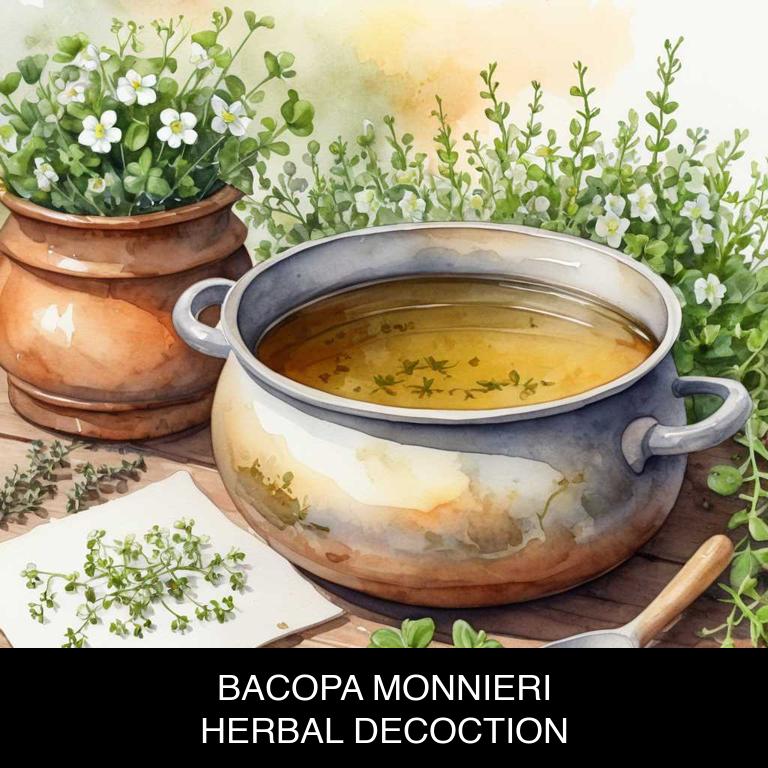
Medicinal Constituents
The list below shows the primary medicinal constituents in Bacopa monnieri decoctions that help with tinnitus.
- Bacosides: These triterpenoid saponins have been shown to have antioxidant properties, which can help reduce oxidative stress in the ear and alleviate tinnitus symptoms.
- Bacopaside i: This triterpenoid saponin has been found to have anti-inflammatory properties, which can help reduce inflammation in the ear and alleviate tinnitus symptoms.
- Bacopasaponin e: This triterpenoid saponin has been shown to have neuroprotective properties, which can help protect the auditory nerve and alleviate tinnitus symptoms.
Parts Used
The list below shows the primary parts of brahmi used to make decoctions for tinnitus.
- Leaves: They are the primary part used due to their high concentration of active compounds like bacosides, which are believed to have neuroprotective and anti-inflammatory properties beneficial for tinnitus.
- Roots: The roots are also commonly used due to their bacoside content and potential ability to reduce inflammation and protect the auditory system.
- Barks: The barks of the Bacopa monnieri plant are sometimes used in decoctions, possibly due to their reported antioxidant and anti-inflammatory properties that could help alleviate tinnitus symptoms.
Quick Recipe
The following recipe gives a procedure to make a basic brahmi for tinnitus.
- Harvest 30-60 grams of fresh or dried bacopa monnieri leaves and flowers from a trusted supplier.
- Chop the harvested material into small pieces to increase its surface area for infusion.
- Combine the chopped material with 1 liter of pure water in a saucepan and bring to a boil.
- Reduce the heat to low and simmer the mixture for 15-20 minutes to extract the active compounds.
- Strain the decoction through a cheesecloth or fine-mesh sieve into a clean container to remove the solids.
4. Curcuma longa
Turmeric decoctions helps with tinnitus because of its potent anti-inflammatory and antioxidant properties.
Curcumin, a key compound in turmeric, has been shown to reduce inflammation in the ear and auditory nerve, which can alleviate tinnitus symptoms. Additionally, curcumin's antioxidant activity helps protect against oxidative stress, which may contribute to tinnitus. By reducing inflammation and promoting healthy cell function, turmeric decoctions may help to quiet ringing, buzzing, or other sounds associated with tinnitus.
This natural remedy has been used for centuries in traditional medicine to promote overall ear health and alleviate hearing-related issues.
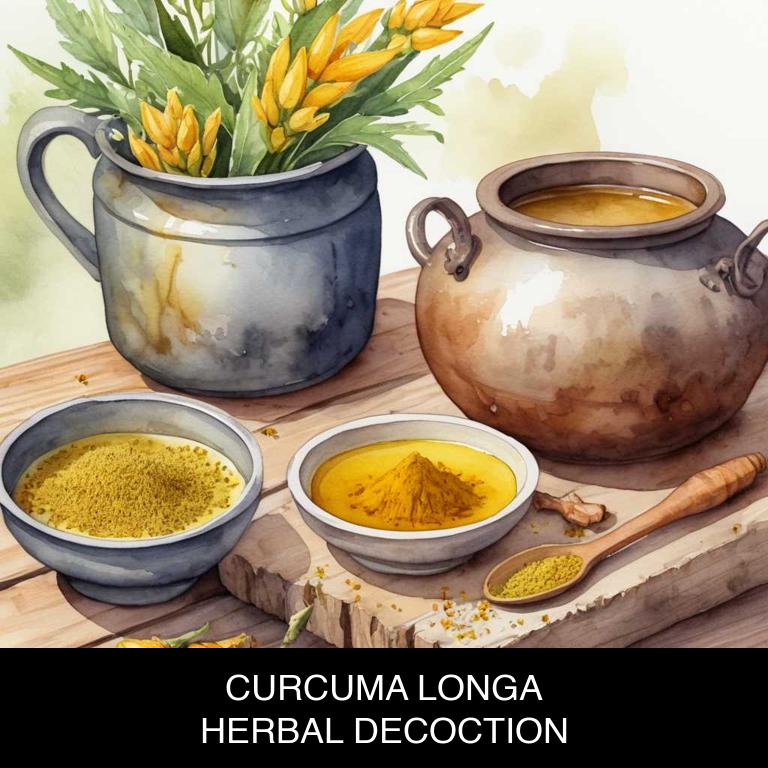
Medicinal Constituents
The list below shows the primary medicinal constituents in Curcuma longa decoctions that help with tinnitus.
- Curcumin: Curcumin, a polyphenolic compound, has anti-inflammatory and antioxidant properties, which may help reduce oxidative stress and inflammation in the auditory system, potentially alleviating tinnitus symptoms.
- Turmerone: Turmerone, a sesquiterpene, has neuroprotective effects and can modulate inflammatory responses, which may help protect the auditory nerve and reduce damage caused by noise-induced tinnitus.
- Demethoxycurcumin: DMC, a curcuminoid, has antioxidant and anti-inflammatory properties, which may help reduce oxidative stress and inflammation in the auditory system, potentially alleviating tinnitus symptoms and promoting auditory system health.
Parts Used
The list below shows the primary parts of turmeric used to make decoctions for tinnitus.
- Roots: Contain compounds that may help reduce inflammation and improve blood flow to the ears, alleviating tinnitus.
- Leaves: May be used to prepare decoctions that help reduce oxidative stress and inflammation, contributing to tinnitus relief.
Quick Recipe
The following recipe gives a procedure to make a basic turmeric for tinnitus.
- Grate 1-2 teaspoons of fresh rhizome of curcuma longa into a clean glass container.
- Combine the grated curcuma longa with 2 cups of water in a saucepan.
- Bring the mixture to a boil over high heat for 5-7 minutes.
- Reduce the heat to low and simmer the decoction for 10-15 minutes.
- Strain the decoction through a cheesecloth or fine-mesh sieve into a clean cup.
5. Lavandula angustifolia
English lavender decoctions helps with tinnitus because of its calming and soothing properties, which can reduce stress and anxiety that often exacerbate the condition.
The decoction's ability to promote relaxation and calmness can help quiet the mind and decrease the perceived loudness of tinnitus sounds. Additionally, lavender's anti-inflammatory properties may help reduce inflammation in the auditory system, which is sometimes linked to tinnitus.
Overall, English lavender decoctions can provide a natural and effective way to manage tinnitus symptoms.
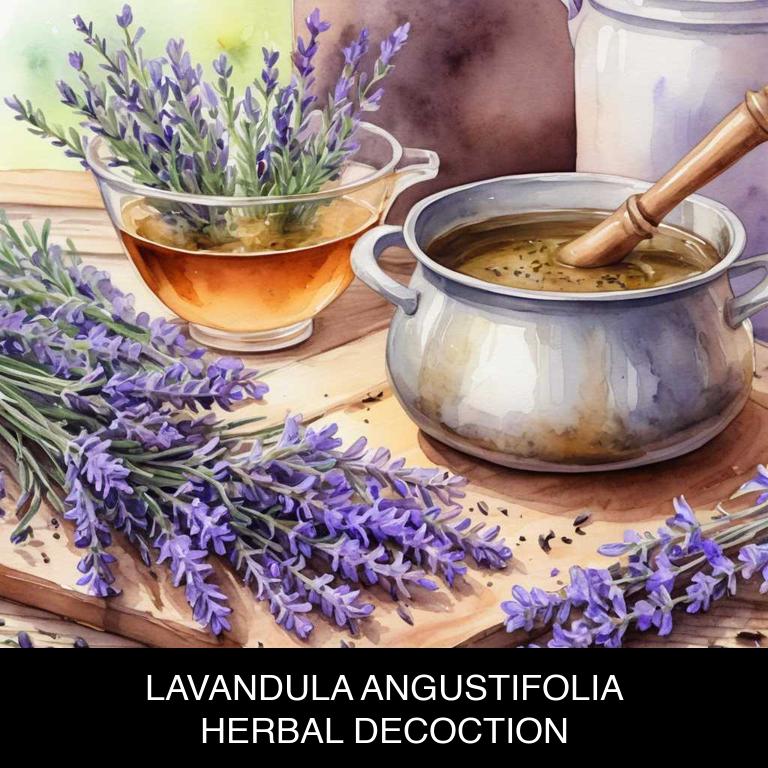
Medicinal Constituents
The list below shows the primary medicinal constituents in Lavandula angustifolia decoctions that help with tinnitus.
- Linalool: This terpene has anti-inflammatory and antioxidant properties, which may help reduce inflammation in the auditory system and alleviate tinnitus symptoms.
- Linalyl acetate: This terpene has a sedative effect, which may help reduce stress and anxiety that can exacerbate tinnitus, promoting relaxation and improving sleep quality.
- Rosmarinic acid: This phenolic compound has antioxidant and anti-inflammatory properties, which may help protect the auditory system from oxidative stress and inflammation, potentially alleviating tinnitus symptoms.
Parts Used
The list below shows the primary parts of english lavender used to make decoctions for tinnitus.
- Leaves: Used due to their essential oil content, which may help alleviate tinnitus symptoms.
- Flowers: Utilized for their calming properties and potential to reduce stress, which may contribute to tinnitus.
- Stems: Employed for their similar essential oil composition to leaves, which may aid in soothing tinnitus.
Quick Recipe
The following recipe gives a procedure to make a basic english lavender for tinnitus.
- Harvest 25-30 grams of dried lavandula angustifolia flowers by cutting them when they are in full bloom.
- Steep the dried flowers in 500 milliliters of boiling water for 5-7 minutes to release their active ingredients.
- Strain the decoction through a cheesecloth or a fine-mesh sieve into a clean container to remove the solids.
- Store the cooled decoction in a dark glass bottle in the refrigerator for up to 3 days.
- Take 10-20 milliliters of the decoction 2-3 times a day as needed for its intended therapeutic uses.
6. Valeriana officinalis
Valerian decoctions helps with tinnitus because of its ability to calm the nervous system and promote relaxation.
The sedative properties of valerian root soothe the auditory nerves, reducing the ringing or buzzing sounds associated with tinnitus. By calming the nervous system, valerian also helps alleviate stress and anxiety, common triggers of tinnitus.
As a natural relaxant, valerian decoctions can provide relief from the distressing symptoms of tinnitus, promoting a sense of calm and well-being for those suffering from this condition.
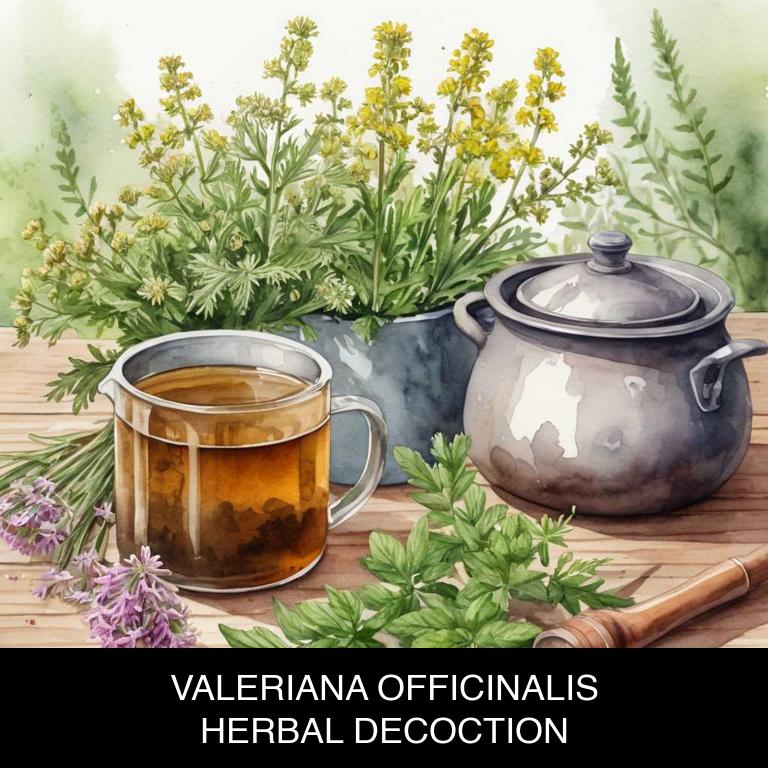
Medicinal Constituents
The list below shows the primary medicinal constituents in Valeriana officinalis decoctions that help with tinnitus.
- Valerenic acid: Valerenic acid, a sesquiterpene, has anti-anxiety and sedative properties, which can help alleviate tinnitus symptoms by reducing stress and promoting relaxation.
- Isovaleric acid amide: Isovaleric acid amide, a valerenic acid derivative, exhibits neuroprotective effects and can help reduce inflammation in the auditory system, potentially alleviating tinnitus symptoms.
- Valeranone: Valeranone, an alkaloid, has been shown to have sedative and anxiolytic effects, which can help reduce the psychological impact of tinnitus and promote better sleep quality.
Parts Used
The list below shows the primary parts of valerian used to make decoctions for tinnitus.
- Roots: The roots are primarily used due to their high content of valerenic acid, which is believed to help alleviate symptoms of tinnitus.
- Roots: The roots also contain valepotriates, which are thought to contribute to their potential therapeutic effects on tinnitus.
- Roots: The roots of Valeriana officinalis are used for their sedative and calming properties, which may help reduce stress and anxiety associated with tinnitus.
Quick Recipe
The following recipe gives a procedure to make a basic valerian for tinnitus.
- Gather 20 grams of dried valeriana officinalis roots and 1 liter of boiling water for the decoction.
- Combine the dried valeriana officinalis roots in a clean glass container with 1 liter of boiling water.
- Steep the mixture for 10 to 15 minutes in a covered container to infuse the roots.
- Strain the decoction through a cheesecloth or a fine-mesh sieve into a clean glass container.
- Store the valeriana officinalis decoction in the refrigerator for up to 3 days or freeze for longer use.
7. Melissa officinalis
Lemon balm decoctions helps with tinnitus because of its ability to promote relaxation, reduce anxiety, and soothe auditory irritations.
The calming properties of lemon balm help to calm an overactive nervous system, which is often linked to the ringing or buzzing sounds associated with tinnitus.
Additionally, the antispasmodic and anti-inflammatory properties of lemon balm can help to alleviate tension in the ear canal and surrounding tissues, providing relief from the constant noise and discomfort caused by tinnitus.
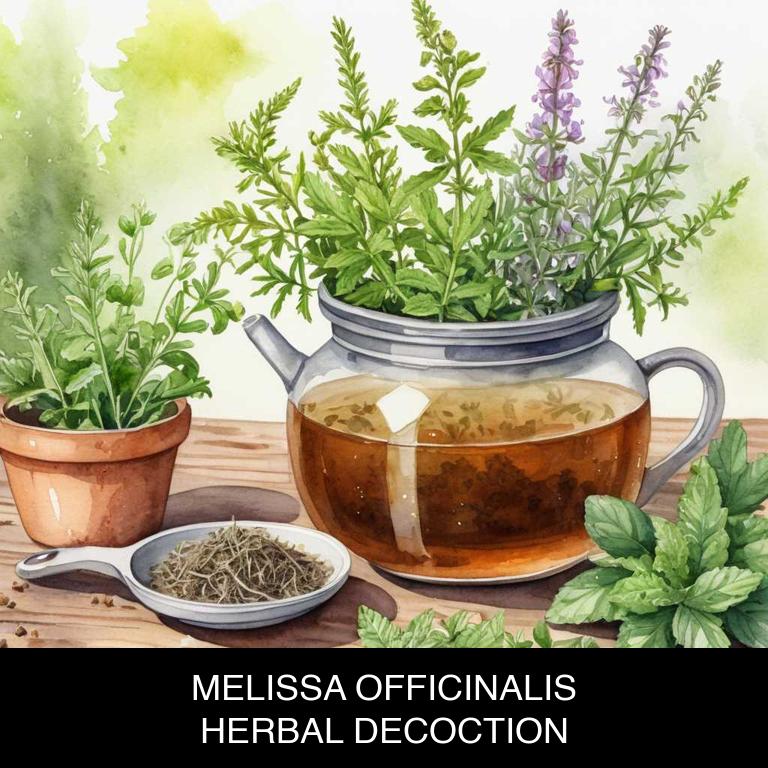
Medicinal Constituents
The list below shows the primary medicinal constituents in Melissa officinalis decoctions that help with tinnitus.
- Rosmarinic acid: This phenolic compound has antioxidant and anti-inflammatory properties, which may help reduce oxidative stress and inflammation in the ear, potentially alleviating tinnitus symptoms.
- Luteolin: As a flavonoid, luteolin has been shown to have neuroprotective effects, which could help mitigate damage to the auditory system and reduce tinnitus severity.
- Geranial: This terpene has been found to have anti-inflammatory and antioxidant properties, which may contribute to its potential benefits in reducing tinnitus symptoms by protecting the ear and surrounding tissues from damage.
Parts Used
The list below shows the primary parts of lemon balm used to make decoctions for tinnitus.
- Leaves: They are the primary source of the herb's essential oils, which are believed to have therapeutic properties that help alleviate tinnitus symptoms.
- Stems: The stems of Melissa officinalis contain a significant amount of the herb's essential oils and other bioactive compounds that may contribute to its potential benefits in treating tinnitus.
- Roots: The roots of the plant are rich in bioactive compounds, including flavonoids and phenolic acids, which may help to reduce inflammation and promote healing in the ear, potentially alleviating tinnitus symptoms.
Quick Recipe
The following recipe gives a procedure to make a basic lemon balm for tinnitus.
- Harvest melissa officinalis leaves and flowers in the summer months when the plant is in full bloom.
- Dry the harvested plant material in a warm dark place for 2 to 3 weeks.
- Combine 1 to 2 teaspoons of dried melissa officinalis with 1 cup of boiling water.
- Steep the mixture for 5 to 10 minutes to allow the active compounds to infuse.
- Strain the decoction and discard the solids before consuming the liquid immediately.
8. Passiflora incarnata
Maypop decoctions helps with tinnitus because of its potent anti-inflammatory and antioxidant properties.
The herb's flavonoids, saponins, and glycosides have been shown to reduce inflammation in the inner ear, which is a common underlying cause of tinnitus.
Additionally, maypop's antioxidants help protect the delicate hair cells in the cochlea from damage caused by free radicals, allowing for improved auditory function and reduced ringing or buzzing sensations associated with tinnitus.
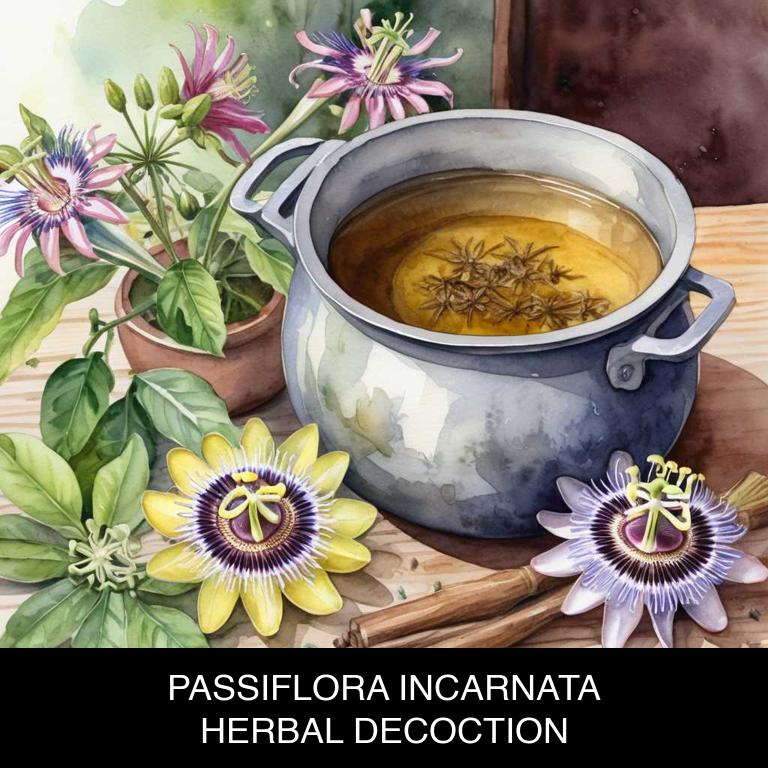
Medicinal Constituents
The list below shows the primary medicinal constituents in Passiflora incarnata decoctions that help with tinnitus.
- Isovitexin: This flavonoid glycoside has been shown to have a sedative effect, which may help reduce the anxiety and stress associated with tinnitus.
- Isosterol: This sterol has been found to have a potential anxiolytic effect, which may help alleviate the emotional distress caused by tinnitus.
- Harmane: This alkaloid has been identified as a potential GABA receptor agonist, which may help modulate neural activity and reduce the perceived loudness of tinnitus sounds.
Parts Used
The list below shows the primary parts of maypop used to make decoctions for tinnitus.
- Leaves: They are used due to their high content of flavonoids and other bioactive compounds that may help alleviate tinnitus symptoms.
- Roots: They are used as they contain alkaloids, such as harmine, which may have a sedative effect and help reduce tinnitus.
- Barks: They are used due to their high content of flavonoids and saponins, which may have anti-inflammatory and antioxidant properties that can help alleviate tinnitus.
Quick Recipe
The following recipe gives a procedure to make a basic maypop for tinnitus.
- Harvest fresh passiflora incarnata flowers and leaves in the early morning to ensure peak potency.
- Dry the harvested plant material in a low-temperature oven at 150 degrees fahrenheit for 2 hours.
- Grind 1-2 teaspoons of dried passiflora incarnata into a fine powder using a mortar and pestle.
- Combine the ground passiflora incarnata powder with 8 ounces of boiling water in a heat-resistant glass cup.
- Steep the mixture for 5-10 minutes then strain and discard the solids to make the decoction.
9. Camellia sinensis
Tea decoctions helps with tinnitus because they contain antioxidants, flavonoids, and other bioactive compounds that work synergistically to reduce inflammation in the inner ear.
The anti-inflammatory properties of herbal tea decoctions can help alleviate the perceived ringing or buzzing sounds associated with tinnitus.
Additionally, many herbs used in these decoctions have been traditionally used to calm the nervous system, which can also contribute to their beneficial effects on tinnitus symptoms.
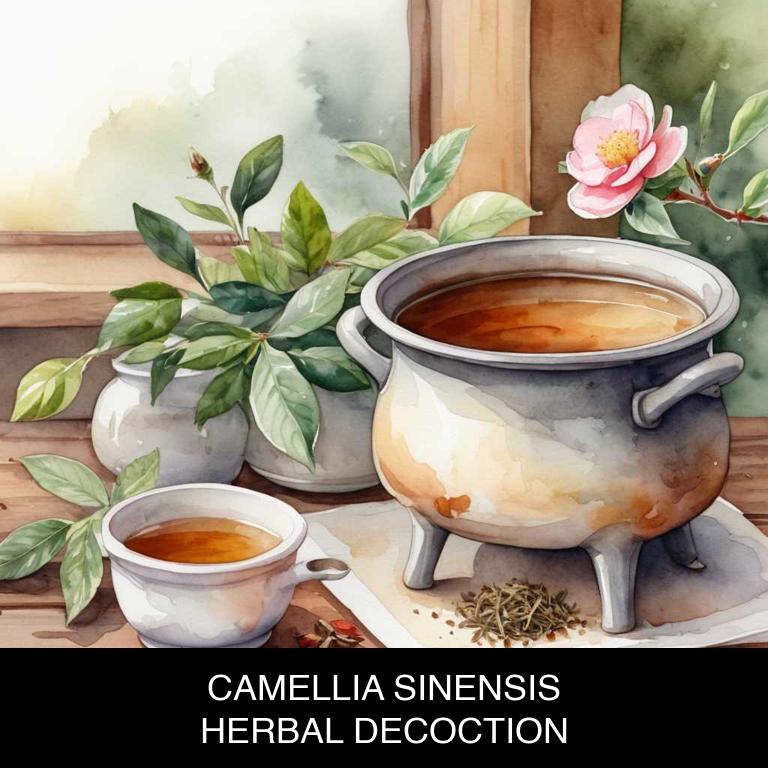
Medicinal Constituents
The list below shows the primary medicinal constituents in Camellia sinensis decoctions that help with tinnitus.
- Flavonoids: Flavonoids, particularly catechins, help alleviate tinnitus by reducing inflammation and oxidative stress in the inner ear, which may contribute to the condition.
- Theaflavins: Theaflavins, formed during the fermentation process, exhibit antioxidant and anti-inflammatory properties that may help mitigate tinnitus symptoms by protecting the ear from damage and promoting healing.
- Catechin gallates: Catechin gallates, formed during the decoction process, have been shown to inhibit the growth of bacteria and fungi that may be contributing to tinnitus, promoting a healthy ear environment.
Parts Used
The list below shows the primary parts of tea used to make decoctions for tinnitus.
- Leaves: Camellia sinensis leaves are commonly used for decoctions as they contain high levels of flavonoids, which have been found to have anti-inflammatory and antioxidant properties that help alleviate tinnitus symptoms.
- Buds: Camellia sinensis buds are another key component of decoctions for tinnitus as they contain flavonoids and other bioactive compounds that may help reduce inflammation and promote auditory health.
- Roots: The roots of Camellia sinensis are also used in decoctions to treat tinnitus, as they contain saponins and other compounds that may help reduce oxidative stress and inflammation in the auditory system.
Quick Recipe
The following recipe gives a procedure to make a basic tea for tinnitus.
- Harvest camellia sinensis leaves in the early morning after the dew has evaporated for optimal flavor.
- Rinse the leaves with filtered water to remove dirt and debris then pat dry with paper towels.
- Measure 2 grams of camellia sinensis leaves per 250 milliliters of water for a standard decoction.
- Steep the leaves in boiling water for 5 to 7 minutes to release their bioactive compounds.
- Strain the decoction through a fine-mesh sieve or cheesecloth into a clean container to discard solids.
10. Glycyrrhiza glabra
Licorice decoctions helps with tinnitus because of its ability to soothe and calm the auditory system.
The flavonoids present in licorice root have been shown to reduce inflammation and oxidative stress, which are believed to contribute to the development and progression of tinnitus. By reducing these factors, licorice decoctions may help to alleviate symptoms such as ringing, buzzing, and hissing sounds in the ears.
Additionally, licorice's anti-inflammatory properties may also help to reduce stress and anxiety, common triggers for tinnitus episodes.

Medicinal Constituents
The list below shows the primary medicinal constituents in Glycyrrhiza glabra decoctions that help with tinnitus.
- Glycyrrhizin: This triterpenoid saponin has anti-inflammatory properties, which may help reduce inflammation and oxidative stress in the inner ear, contributing to tinnitus relief.
- Licopyrone a: A phenolic compound found in Glycyrrhiza glabra, licopyrone A has antioxidant properties that may help protect the inner ear from damage caused by free radicals, potentially alleviating tinnitus symptoms.
- Isoliquiritigenin: This isoflavone has anti-inflammatory and antioxidant effects, which may help reduce inflammation and oxidative stress in the inner ear, leading to potential tinnitus relief.
Parts Used
The list below shows the primary parts of licorice used to make decoctions for tinnitus.
- Roots: They are rich in glycyrrhizin, a compound that has anti-inflammatory and antioxidant properties, which may help alleviate tinnitus symptoms.
- Leaves: Leaves are used due to their secondary metabolites, including flavonoids and phenolic acids, which have been shown to possess anti-inflammatory and antioxidant properties that may benefit tinnitus patients.
- Barks: Barks of Glycyrrhiza glabra contain glycosides, including glycyrrhizin, which may help reduce inflammation and oxidative stress in the body, potentially alleviating tinnitus symptoms.
Quick Recipe
The following recipe gives a procedure to make a basic licorice for tinnitus.
- Gather 1 tablespoon of dried glycyrrhiza glabra roots and clean them thoroughly with a brush.
- Combine the cleaned roots with 2 cups of boiling water in a heat-resistant cup.
- Steep the mixture for 10-15 minutes or until the liquid has reduced slightly.
- Strain the decoction through a fine-mesh sieve into a clean cup.
- Drink the decoction immediately while it is still warm and within 30 minutes.
What is the best combination of herbal decoctions to use for tinnitus?
The best combination of herbal decoctions that help with tinnitus is Ginkgo biloba and Hawthorn.
Ginkgo biloba is known to improve blood flow to the ears and reduce inflammation, while Hawthorn helps to dilate blood vessels and promote circulation. Additionally, incorporating licorice root and ginger decoctions can also aid in reducing stress and inflammation. A balanced blend of these herbs may help alleviate tinnitus symptoms by improving ear circulation, reducing inflammation, and promoting overall well-being.
Consult a healthcare professional before using any herbal remedies.
What ailments similar to tinnitus are treated with herbal decoctions?
Ailments similar to tinnitus/decoctions.html">tinnitus/decoctions.html">tinnitus that are treated with herbal decoctions are various ear and hearing-related conditions, such as Meniere's disease, vertigo, and hearing loss.
Herbal remedies like Ginkgo biloba, St. John's Wort, and passionflower are used to alleviate symptoms of ringing in the ears, dizziness, and imbalance.
Decoctions made from these herbs may also be effective in treating ear infections, hearing loss due to age-related conditions, and other auditory problems.